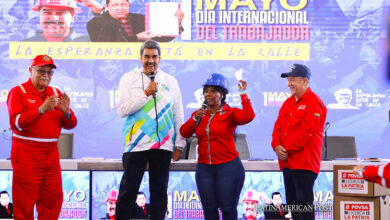Colombian Soccer Grapples with FIFA Penalties: Impact on Matches, Finances, and Historical Precedent

Colombian Soccer Faces FIFA Sanctions
The Colombian national soccer team, affectionately known as ‘la Tricolor,’ now finds itself in the crosshairs of FIFA, facing a series of fines and matches played with reduced stadium capacities at the iconic Metropolitano stadium in Barranquilla. These penalties stem from a combination of incidents involving the coaching staff and inappropriate behavior by fans. While these sanctions might appear as routine disciplinary actions, they are beginning to cause significant headaches for the Colombian Soccer Federation (FCF). The issue is that tickets for several upcoming matches have already been sold under the subscription scheme, adding an extra layer of complexity to an already challenging situation.
However, it’s crucial to note that Colombia is not the sole casualty of FIFA’s disciplinary measures. Similar sanctions have been imposed on matches involving football powerhouses like Argentina, Chile, and Uruguay, all of whom have been penalized for various behaviors and incidents during the initial six rounds of the qualifying phase for the 2026 FIFA World Cup. Brazil, Bolivia, Ecuador, and Peru are also facing fines. The situation has raised eyebrows, particularly concerning the lack of exemplary penalties against Brazil despite the severe disturbances that marred their match against Argentina.
Colombia’s Specific Penalties and Consequences
In examining the specifics of Colombia’s penalties and the responsible parties, FIFA has declared that the next Colombian national soccer team match must have 25% fewer spectators at the Metropolitano stadium. This means that the forthcoming game against the Argentine national soccer team, scheduled for September 2024, will be subject to this reduced attendance requirement.
In addition to the reduced capacity, Colombia has been slapped with a financial penalty of 80,500 Swiss Francs, translating to over 370 million Colombian Pesos, or roughly 86,000 Euros, or nearly 95,000 US Dollars. This sum is earmarked for initiatives and training programs to combat discrimination within soccer. These punitive measures stem from delays in commencing matches against Chile and Uruguay in September and October, as well as incidents of discriminatory behavior towards Chilean players and instances of objects being thrown at Uruguayan players.
Colombian Soccer Federation’s Response and Appeal Process
The consequences of these sanctions have not gone unnoticed. Andrés Tamayo, the secretary of the Colombian Soccer Federation, recently addressed the matter on the ‘Blog Deportivo’ program on Blu Radio. He revealed that FIFA had sent informal notifications regarding the incidents that led to these penalties. However, despite the FCF’s efforts to provide a robust defense, their arguments proved insufficient to avoid the sanctions.
Tamayo explained that there are avenues for appeal available to the Colombian Soccer Federation. They can initially appeal to the FIFA Appeals Committee. Suppose they believe the response to be unjust or in need of reduction. In that case, they can turn to the Court of Arbitration for Sport (CAS), the final arbiter in such matters. Tamayo outlined the process: “We received notice of the sanctions without the arguments. We require the complete rationale or comprehensive reasons for our penalization to lodge an appeal, even though we submitted evidence regarding the cases. This will allow us to thoroughly review the matter during the appeal process before the September match.”
FCF Initiates Appeal Process
The FCF has initiated this appeal process by requesting a comprehensive basis for FIFA’s sanctions. They have a ten-day window, commencing from the notification received on January 10, 2024, to make their case. The duration of FIFA’s response will dictate the overall timeline for resolution. Suppose FIFA’s decision remains unfavorable or fails to significantly reduce the initial penalty. In that case, the FCF retains the option to appeal to CAS, provided they do so within 21 days of receiving FIFA’s response.
Also read: Latin America’s Battle Against Online Abuse in Women’s Soccer
While these disciplinary actions may seem like a confrontation between the Colombian Soccer Federation and FIFA, it’s essential to note that such incidents and subsequent penalties have occurred in the past. Tamayo underscored the normalcy of the situation, stating, “FIFA itself, in its decision, suggests that the reductions in stadium capacity may affect the stands behind the goals. We’ve had to serve a similar penalty, and everything was managed adequately.” This historical context highlights that while the penalties are indeed a setback, they are not unprecedented. Colombian soccer has navigated such challenges in the past, emerging more robust and more resilient.





